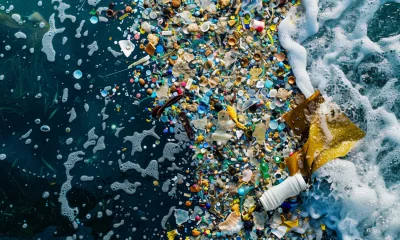Context:
A study has revealed that nanoplastics derived from single-use plastic bottles (SUPBs) contribute significantly to the spread of antibiotic resistance (AR).
More on the News

- Researchers from the Institute of Nano Science and Technology (INST) Mohali, an autonomous institution under the Department of Science and Technology (DST), delved into the impact of plastic nanoparticles on bacteria.
- The study published in the journal ‘Nanoscale’ was aimed to determine whether nano-plastics could transform these beneficial bacteria into carriers of AR genes, potentially endangering gut microbiome health.
- Researchers utilized the used plastic water bottles to synthesize environmentally relevant nano plastic particles as these polyethene terephthalate bottle-derived nano plastics (PBNPs) better represent the actual pollutant nano plastics generated by single-use plastic bottles.
Key Highlights of the Study
- These findings underscore how nanoplastics can inadvertently transform beneficial bacteria, such as Lactobacillus acidophilus, into reservoirs of AR genes.
- This could lead to the transfer of AR genes to pathogenic bacteria, exacerbating the AR crisis.
- Mechanisms of AR Gene Transfer: The research revealed two novel mechanisms through which PBNPs facilitate the spread of AR genes:
- Direct Transformation Pathway:
- PBNPs act as physical carriers, transporting AR plasmids across bacterial membranes.
- This promotes direct gene transfer between bacteria.
- Outer Membrane Vesicle (OMV)-Induced Transfer Pathway:
- PBNPs induce oxidative stress, damaging bacterial surfaces.
- This activates stress response genes and increases OMV secretion.
- These OMVs, loaded with AR genes, act as potent vectors, transferring AR genes across bacterial species, including unrelated ones.
- Protecting beneficial bacteria is essential to preserve gut microbiome integrity.
- Preventing nanoplastic contamination could reduce the risk of AR gene transfer from beneficial to harmful bacteria.
- Educating people on the risks associated with single-use plastics, promoting responsible plastic use and efficient disposal mechanisms.

